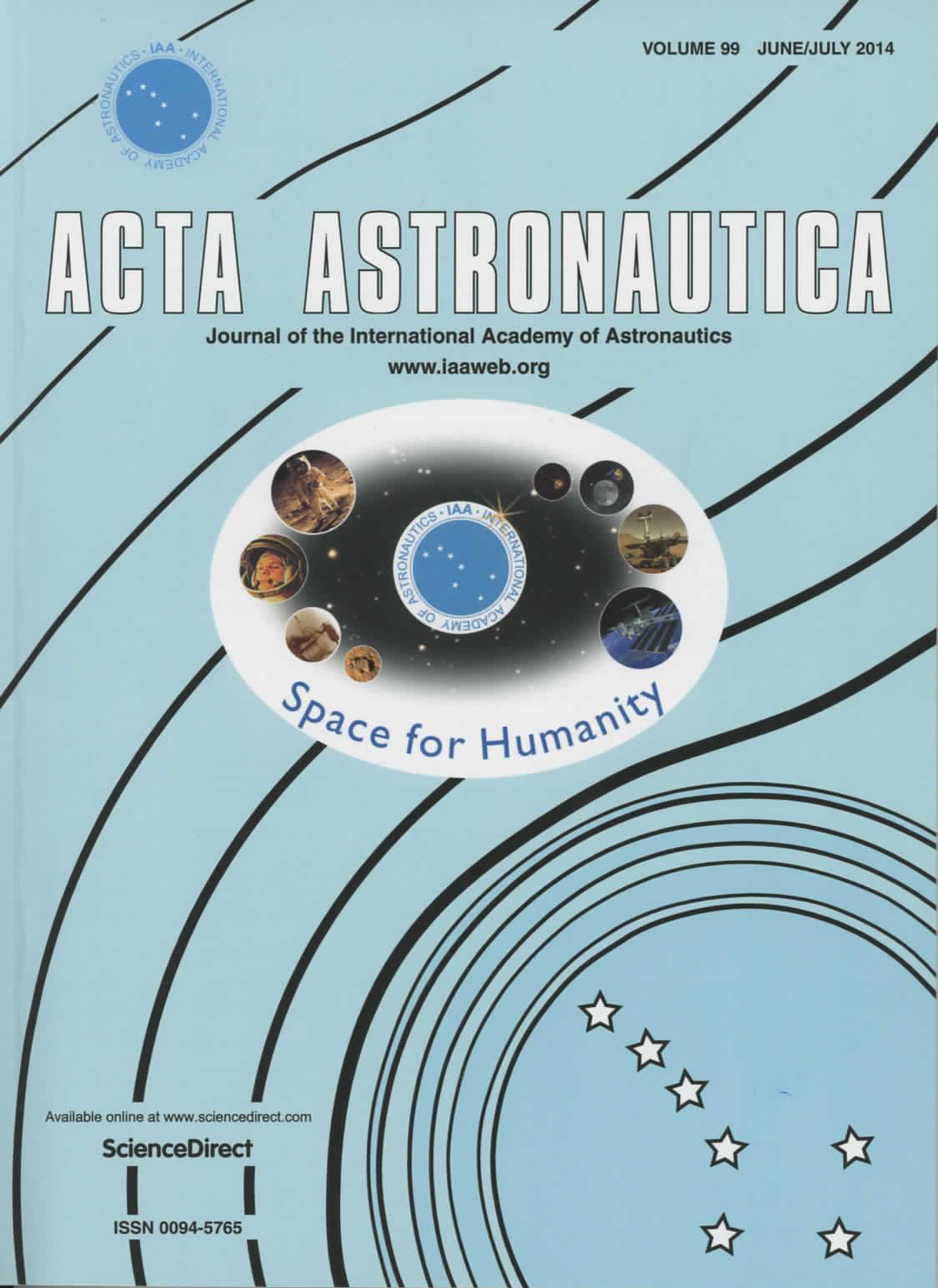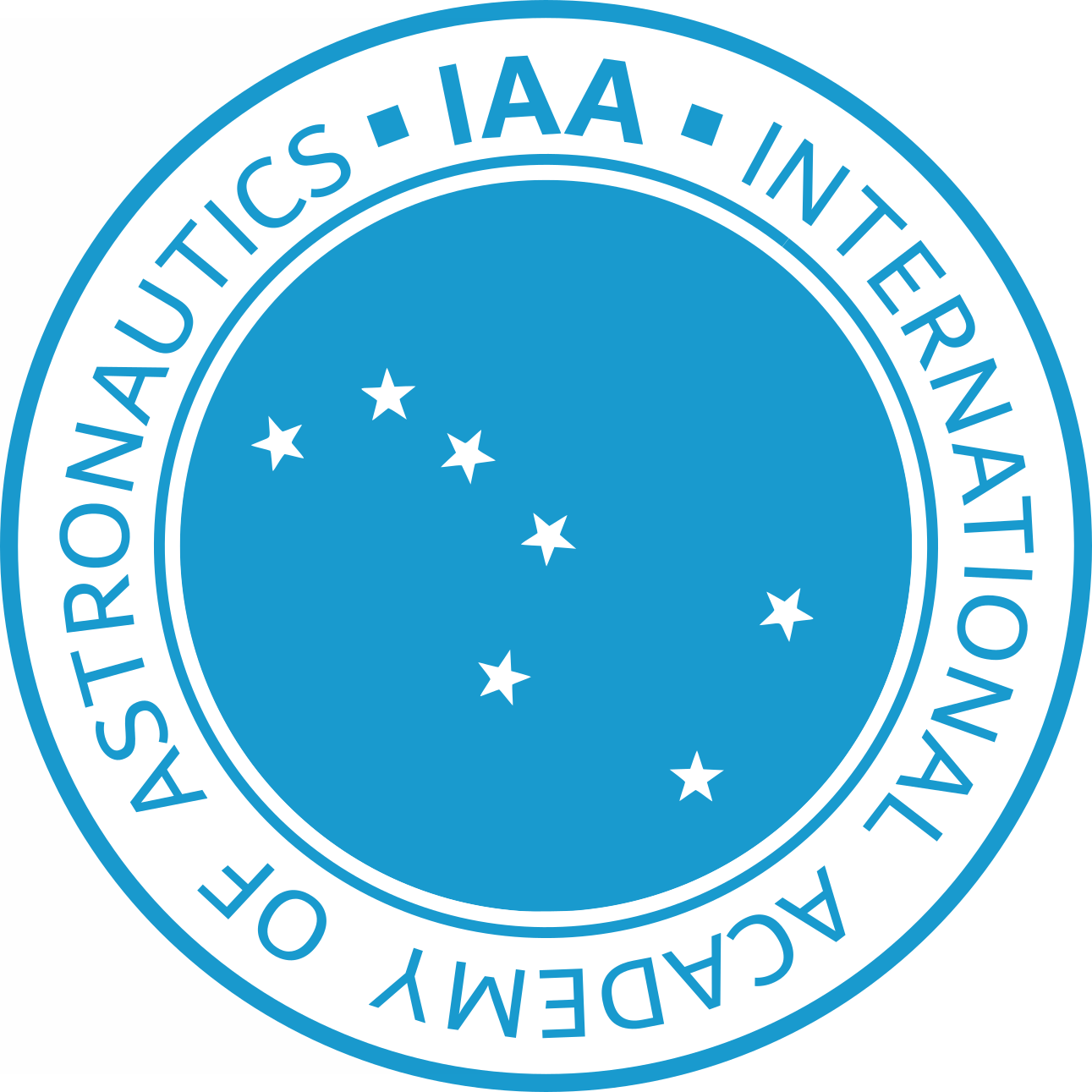 |
The journal Acta Astronautica first appeared in 1955 under the name of Astronautica Acta and later renamed Acta Astronautica for grammatical reasons in Latin language in 1959. The journal Acta Astronautica, 2500 pages a year, covers developments in space science technology related to peaceful scientific exploration of space and its exploitation for human welfare and progress, the conception, design, development and operation of space-borne and Earth-based systems. In addition to the regular issues of contributed papers and transaction notes, the journal publishes selected proceedings from IAA congresses. |
IAA Acta Astronautica Journal
The journal IAA Acta Astronautica is published monthly by Elsevier Science Ltd in London under the auspices of the IAA Publications and Communication Committee chaired by Marius-Ioan Piso, Romania.
The Editor in Chief is Jeng-Shing Chern (China Taiwan)
The Co-Editors are:
Space Physical Sciences:
Steve Croft (USA), Vishal Gajjar (USA), Elisabeth Piotelat (France), Radhika Ramachandran (India), Nickolay Smirnov (Russia), Antonio Viviani (Italy)
Space Life Sciences:
Olivier Contant (USA), Christos Frantzidis (Greece), Antonios Kyparos (Greece), Oliver Ullrich (Switzerland)
Space Technology & System Development:
Riccardo Bevilacqua (USA), Christophe Bonnal (France), Jie Chen (China), Filippo Graziani (Italy), Krishna D. Kumar (Canada), Bingfeng Pan (China), Mauro Pontani (Italy) Jiawen Qiu (China)
Space System Operations & Utilization:
Anna Guerman (Portugal), Robert G. Melton (USA), Arun K. Misra (Canada), Maria-Antonietta Perino (Italy), Yury N. Razoumny (Russia), Zhengyu Song (China), Zheng Hong (George) Zhu (China)
Space Policy, Law & Economics:
Corinne M. Jorgenson (USA), Leslie Tennen (USA)
Space and Society, Culture and Education:
Yi-Wei (Eva) Chang (China Taiwan), Ingemar Skoog (Sweden)
Transdisciplinary Astronautical Arts, Sciences, and Engineering:
Moriba Jah (USA), Danielle Wood (USA)
The Honorary Editor is Jean-Pierre Marec (France)
The Editor for Ex-Mundo Astronautico is Jean-Michel Contant (France)
The Managing Editor is Eva Yi-Wei Chang (China Taiwan)
For more detailed information, please visit the Elsevier website at:
https://www.sciencedirect.com/journal/acta-astronautica
Scope of the Journal
The journal Acta Astronautica first appeared in 1959 and is published monthly by Elsevier Science Ltd in London under the auspices of the IAA Publications and Communication Committee chaired by Prof. Marius-Ioan Piso, Romania.
In order to provide opportunities for initiation of focused activities, to facilitate and observe such activities, enable the exchange of ideas and information among interested members of the Academy and recommend appropriate measures, the journal of the Academy Acta Astronautica is divided in six areas with a scope described below. The general scopes of responsibility of each area of the journal may be amended by the IAA Board of Trustees in the future.
Scope of Space Physical Sciences
Basic Science in General, Planetary, Interplanetary and Interstellar Exploration, Astronomy, Earth Sciences, Space Physics, Space Weather, Space Material Sciences, Search for Extraterrestrial Intelligence (SETI).
Scope of Space Life Sciences
Life Sciences in General, Space Physiology and Medicine, Human Factors, Space and Planetary Biology and Biophysics, Biotechnology and Life Support, Astrobiology.
Scope of Space Technology & System Development
Engineering Sciences in General, Research and Development to Enable Future Space Activities, Human Exploration of the Solar System, Development of New Space Facilities in or Beyond Earth Orbit, Advanced Propulsion, Interstellar Space Exploration, Space Resources.
Scope of Space System Operation & Utilization
Space Activities and New Concepts that Directly Relate to Space Operations and Utilization, Communications, Remote Sensing, and Navigation Satellites, Small Satellites for Developing Nations, Countries Emerging in Space Technology, and Earth Observation, Safety, Rescue and Quality, EVA Protocols and Operations, Utilization of Space Facilities Such As Space Stations.
Scope of Space Policies, Law & Economics
Global Policy Issues, International Cooperation and Competition, Intergovernmental Relations, Management, Political Science, Sociology, Psychology, Social Science in General, Space Law, Scientific-legal Liaison, Economic Issues Associated With Developing New Space Applications such as Solar Power Satellites, Public Space Travel, Space Debris, Economics of Launch Systems, Financing, Commercialization and Privatization Issues in General, Secondary Interest in Areas such as Space Debris and Search for Extraterrestrial Intelligence (SETI).
Scope of Space, Society, Culture & Education
– Societal Needs: Environmental Issues – Energy, Green, Sustainability, Waste, Water, Health and Well-being, Influence of Space on Society Drivers, Technology and Knowledge Transfer,
– Education and Outreach: Communications, Public Relations, Information Dissemination, Media, Education – Teaching, Learning, Training, Workforce Development, Space Awareness, Impact of Space Activities,
– Art and Culture: Applied Arts, Fine Arts, Performing Arts, Plastic Arts, Visual Arts, Architecture, Industrial Design, Interior Design, Cultural Studies, Cultural Anthropology, Archaeology, Fashion and Lifestyle, Literature, Science Fiction, SETI – Social and Cultural Dimensions, Terminology in Space Activities,
– Humanities and History: History of Astronautics and Space Science, Museums and Libraries, Philosophy, Ethics, Religion, Sociology, Astrosociology.
Scope of Transdisciplinary Astronautical Arts, Sciences, and Engineering:
Scholarly efforts conducted by investigators and practitioners from different disciplines working jointly to create new conceptual, theoretical, methodological, and translational innovations that integrate and move beyond discipline-specific approaches to address common space-related problems. This area is the fusion of disciplines from space law and policy, to social sciences, computational engineering, astronomy, anthropology and culture, through astrodynamics and more.
ACTA ASTRONAUTICA
Instructions to Authors.
More detailed information is available at:
https://www.sciencedirect.com/journal/acta-astronautica
Submission to this journal proceeds totally online.
Use the Acta Astronautica guidelines to prepare your article.
Please use the EES homepage of this journal at
https://www.editorialmanager.com/aastronautica/default.aspx
IAA Academicians are invited to order Acta Astronautica journal at a special rate (please visit the restricted member section).
To order or to download Acta Astronautica articles online, please visit the following websites:
https://www.elsevier.com/journals/acta-astronautica/0094-5765
Every year, several issues of Acta Astronautica (AA), the Journal of the International Academy of Astronautics (IAA), are dedicated to one single subject. Such issues, called Special Issues (SI), usually include papers presented at either stand-alone IAA conferences or symposia or symposium of the International Astronautical Congress (IAC). They may also include papers which are specially invited for the Special Issue.
Organizers of IAA standalone conferences or IAC symposia have to submit to the Academy nomination of Guest Editors (optimally one responsible person per Special Issue). This nomination has to be done at least 3 months prior the symposium.
For more detailed information, please contact the IAA Office.
We use cookies to make our website and shop effective, secure and user-friendly. For more information see our Privacy Policy. Use of this Site is subject to express terms of use. By using this site, you signify that you agree to our Privacy Policy and the use of cookies and agree to be bound by these Terms and Conditions.
